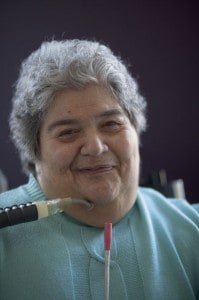

Getting routine medical screenings can be a stressful challenge for women with physical disabilities but it’s also a matter of life and death. Women with mobility impairments aren’t at a higher risk for breast cancer but they are one-third more likely to die from it.
This sobering statistic has motivated Marilyn Saviola, who runs the Women’s Health Access Program for Independence Care System, to fight for care that every woman deserves. In seven years, Saviola has greatly increased the accessibility of breast and gynecological care for many women who haven’t been to a doctor in years because of past bad experiences.
The women’s health project launched in 2008 with a grant from Susan G. Komen Greater NYC. It was a difficult and slow beginning, but Saviola found a local partner to provide mammography services to her clients. Soon three other partner sites were added along with gynecology services. The New York City Council also budgeted $5 million to purchase accessible medical equipment for the program’s partners.
Education has been a core component of the program. Often medical professionals haven’t received any training on disability and aren’t aware of their responsibilities to the patient. “Many times they think they can’t transfer someone because if they get hurt, it’s a liability,“ she says. “They don’t realize there’s a greater liability if you refuse people services.“ The program notifies medical professionals about their legal responsibilities in providing care to patients with disabilities.
It’s been a long, rewarding journey for Saviola, but there is much that is left to do. “It’s late in the health care game to finally address these crucial issues, but the health of people with disabilities has suffered for far too long,” she says. “It’s time to make health care accessible throughout New York City.”
Support New MobilityWait! Before you wander off to other parts of the internet, please consider supporting New Mobility. For more than three decades, New Mobility has published groundbreaking content for active wheelchair users. We share practical advice from wheelchair users across the country, review life-changing technology and demand equity in healthcare, travel and all facets of life. But none of this is cheap, easy or profitable. Your support helps us give wheelchair users the resources to build a fulfilling life. |


Recent Comments
Bill on LapStacker Relaunches Wheelchair Carrying System
Phillip Gossett on Functional Fitness: How To Make Your Transfers Easier
Kevin Hoy on TiLite Releases Its First Carbon Fiber Wheelchair